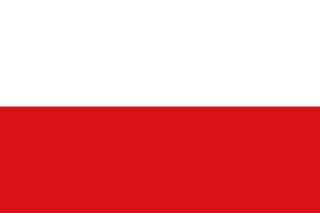
Tyrol is an Austrian federal state. It comprises the Austrian part of the historical Princely County of Tyrol. It is a constituent part of the present-day Euroregion Tyrol–South Tyrol–Trentino. The capital of Tyrol is Innsbruck.
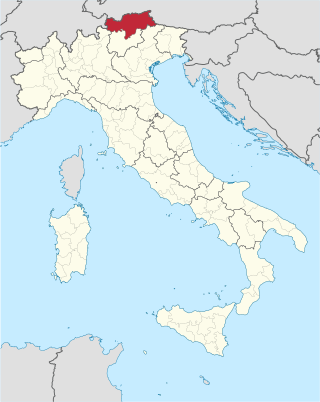
South Tyrol is an autonomous province in northern Italy. An English translation of the official German and Italian names could be the Autonomous Province of Bolzano – South Tyrol, reflecting the multilingualism and different naming conventions in the area. Together with Trentino, South Tyrol forms the autonomous region of Trentino-Alto Adige/Südtirol. The province is the northernmost of Italy, the second largest with an area of 7,400 square kilometres (2,857 sq mi), and has a total population of about 534,000 inhabitants as of 2021. Its capital and largest city is Bolzano.
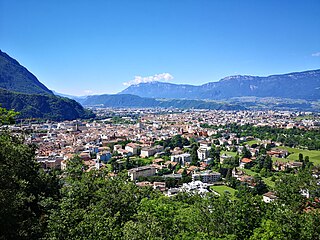
Bolzano is the capital city of the province of Bolzano - South Tyrol, in Northern Italy. With a population of 108,245, Bolzano is also by far the largest city in South Tyrol and the third largest in historical Tyrol. The greater metro area has about 250,000 inhabitants and is one of the urban centres within the Alps.

Trentino-Alto Adige/Südtirol is an autonomous region of Italy, located in the northern part of the country. The region has a population of 1.1 million, of whom 62% speak Italian as their mother tongue, 30% speak South Tyrolean German and several foreign languages are spoken by immigrant communities. Since the 1970s, most legislative and administrative powers have been transferred to the two self-governing provinces that make up the region: the province of Trento, commonly known as Trentino, and the province of Bolzano, commonly known as South Tyrol. In South Tyrol, German remains the sizeable majority language.
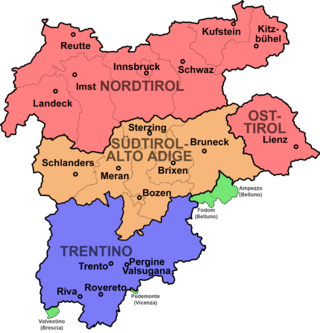
East Tyrol, occasionally East Tirol, is an exclave of the Austrian federal state of Tyrol, separated from North Tyrol by parts of Salzburg State and parts of Italian South Tyrol. It is coterminous with the administrative district (Bezirk) of Lienz.

The (Princely) County of Tyrol was an estate of the Holy Roman Empire established about 1140. After 1253, it was ruled by the House of Gorizia and from 1363 by the House of Habsburg. In 1804, the County of Tyrol, unified with the secularised prince-bishoprics of Trent and Brixen, became a crown land of the Austrian Empire. From 1867, it was a Cisleithanian crown land of Austria-Hungary.

Altrei is a comune (municipality) and a village in South Tyrol in northern Italy.
Margreid an der Weinstraße, often abbreviated to Margreid or Magrè, is a comune (municipality) and a village in South Tyrol in northern Italy, located about 25 kilometres (16 mi) southwest of the city of Bolzano.

Montan an der Weinstraße is a municipality with 1,701 inhabitants and a village in the South of South Tyrol in northern Italy, about 15 km south of Bolzano. The name Montan derives from the Latin mons ("mountain").
Percha is a comune (municipality) and a village in South Tyrol in northern Italy, located about 60 kilometres (37 mi) northeast of Bolzano. This Percha is not to be confused with Percha of the Federal Republic of Germany.

Salorno sulla Strada del Vino is the southernmost comune (municipality) and a village in South Tyrol in northern Italy, located about 30 kilometres (19 mi) southwest of the city of Bolzano. It is one of only five mainly Italian-speaking municipalities in South Tyrol.

The Ritten Railway is an electric light railway which originally connected Bolzano with the Ritten plateau and today continues to operate on the plateau, connecting the villages located there.

In 1919, at the time of its annexation, the middle part of the County of Tyrol which is today called South Tyrol was inhabited by almost 90% German speakers. Under the 1939 South Tyrol Option Agreement, Adolf Hitler and Benito Mussolini determined the status of the German and Ladin (Rhaeto-Romanic) ethnic groups living in the region. They could emigrate to Germany, or stay in Italy and accept their complete Italianization. As a consequence of this, the society of South Tyrol was deeply riven. Those who wanted to stay, the so-called Dableiber, were condemned as traitors while those who left (Optanten) were defamed as Nazis. Because of the outbreak of World War II, this agreement was never fully implemented. Illegal Katakombenschulen were set up to teach children the German language.

The Tyrol–South Tyrol–Trentino Euroregion is a Euroregion formed by three different regional authorities in Austria and Italy: the Austrian state of Tyrol and the Italian autonomous provinces of South Tyrol and Trentino.
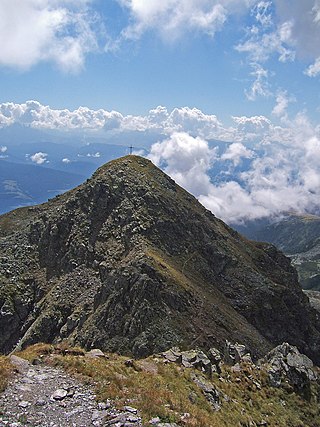
The Sarntal Alps are a mountain range of the Eastern Rhaetian Alps, in South Tyrol (Italy), which surrounds the Sarntal (valley). It is limited by the Etschtal, Eisacktal, Passeiertal and the Jaufen Pass.

Tyrol is a historical region in the Alps of Northern Italy and western Austria. The area was historically the core of the County of Tyrol, part of the Holy Roman Empire, Austrian Empire and Austria-Hungary, from its formation in the 12th century until 1919. In 1919, following World War I and the dissolution of Austria-Hungary, it was divided into two modern administrative parts through the Treaty of Saint-Germain-en-Laye:

Eurac Research is a private research center headquartered in Bolzano, South Tyrol. The center has eleven institutes and five centers. Eurac Research has more than 800 partners spread across 56 countries. Eurac Research collaborates with international organizations such as the Alpine and Carpathian Conventions, UNEP and UNIDO in the context of sustainable development and energy technology, and also hosts the headquarters of the Permanent Secretariat of the Alpine Convention at its headquarters in Bolzano. Core funding is provided by the autonomous province of South Tyrol, with additional financing coming from membership fees and European project funds.
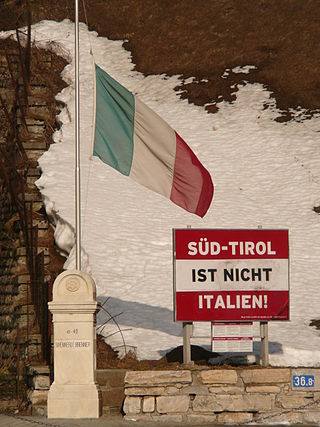
The South Tyrolean independence movement is a political movement in the Italian autonomous province of South Tyrol that calls for the secession of the region from Italy and its reunification with the State of Tyrol, Austria. Concurrently, some groups favor the establishment of an interim Free State of South Tyrol as a sovereign nation while reintegration is organized.
Rittner is a surname. Notable people with the surname include:

The Ritten is a mountain ridge in the southeast of the Sarntal Alps in South Tyrol. It is bordered in the west by Sarntal, in the east by Eisacktal and in the south by the Bozner basin. In the north, it is dominated by the Rittner Horn (2,260 m). The approximately 900 to 1,300 m high settlements on the mountain ridge belong to the municipality of the same name Ritten.
















